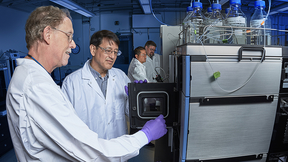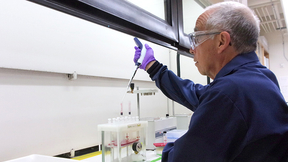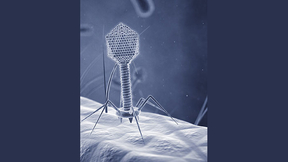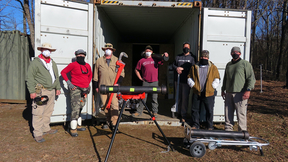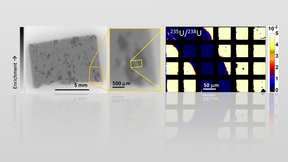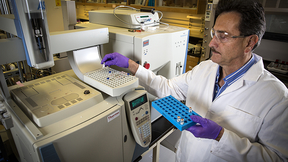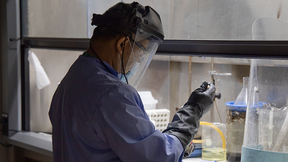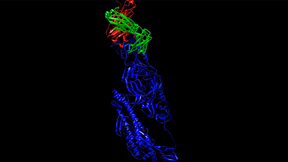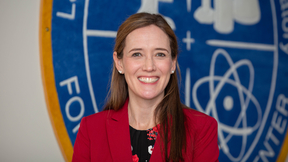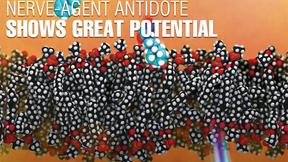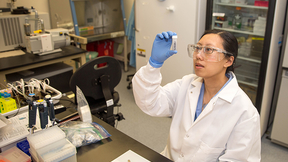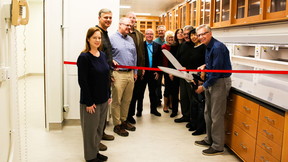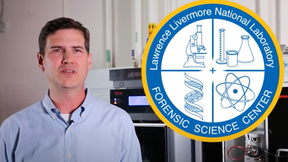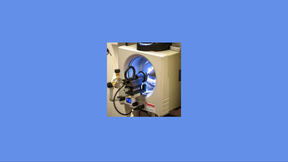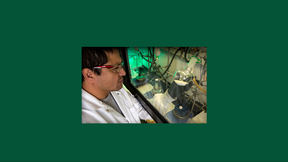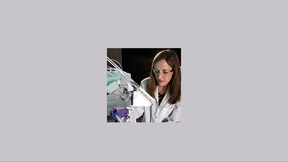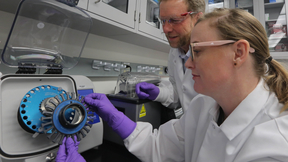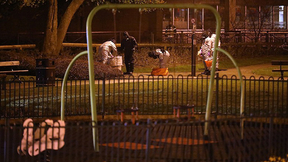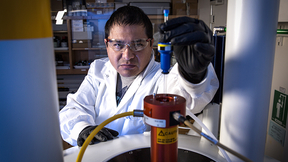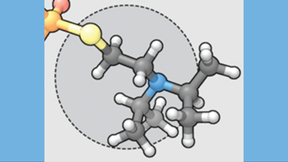Back
A team of Lawrence Livermore National Laboratory (LLNL) scientists has developed a new technique to analyze fentanyl in human blood and urine samples that could aid work in the fields of medicine and chemical forensics. Led by Carlos Valdez, an LLNL synthetic chemist and lead author, the team discussed its new fentanyl analysis approach in a paper recently published in the…
Even after taking highly stressful exams in college, grades can still be important. Just ask researchers at Lawrence Livermore National Laboratory’s (LLNL) Forensic Science Center (FSC). Every fall, chemists and other researchers from the FSC spend two weeks of long days undertaking the Organisation for the Prohibition of Chemical Weapons (OPCW) environmental proficiency…
Scientists in the Forensic Science Center at Lawrence Livermore have partnered with San Diego State University and UCSD to advance bacteriophage therapy.
Following a terrorist bombing, can the bomb maker be identified by skin proteins left on the bomb components they handled? To address this question, Lawrence Livermore National Laboratory (LLNL) personnel from Weapons Complex Integration (WCI) and Global Security (GS) Forensic Science and Biosecurity Centers (FSC/BSC) subjected notional bomb components handled by LLNL…
Lawrence Livermore National Laboratory (LLNL) scientists received mock evidence, consisting of two uranium oxide (UO2) fuel pellets, as part of an international nuclear forensic exercise in support of a simulated nuclear smuggling investigation. The exercise was part of the CMX-5 Collaborative Materials Exercise organized by the Nuclear Forensics International Technical…
The Forensic Science Center is an important ally in the international endeavor to prohibit chemical warfare agents.
In another month-and-a-half, a score of chemists from Lawrence Livermore National Laboratory's Forensic Science Center (FSC) will start two weeks of long days to undertake the Organization for the Prohibition of Chemical Weapons (OPCW) environmental proficiency test. Livermore chemists have been taking the proficiency tests each October since 2001, with LLNL serving as one…
Lawrence Livermore National Laboratory (LLNL) scientists are contributing to the global fight against COVID-19 by combining artificial intelligence/machine learning, bioinformatics and supercomputing to help discover candidates for new antibodies and pharmaceutical drugs to combat the disease. See the visualization Backed by five high performance computing (HPC) clusters…
A chemist who is the director of Lawrence Livermore National Laboratory’s (LLNL) Forensic Science Center is the recipient of the 2020 “Outstanding Early Career Achievement in Forensic Science Award.” The award, given to LLNL’s Audrey Williams, is presented annually by the American Academy of Forensic Sciences (AAFS) Past Presidents Council. This year’s award will be…
Scientists at LLNL’s Forensic Science Center and Biosecurity Center have formulated molecule LLNL-02, the first molecule capable of dual protection against nerve agents.
Any single hair from anywhere on the human body can be used to identify a person. This conclusion is one of the key findings from a nearly year-long study by a team of researchers from Lawrence Livermore National Laboratory’s (LLNL) Forensic Science Center (FSC) and Michigan State University. The team’s study, published in Scientific Reports, a journal of Nature Magazine,…
Lawrence Livermore National Laboratory (LLNL) continuously upgrades facilities and equipment on the main campus. Infrastructure investments help ensure that scientists, engineers and support staff carry out LLNL’s mission safely and effectively. Building 151 is the latest site of extensive renovations. Construction recently finished in four laboratory spaces, combining two…
The FSC guides the field toward more objective techniques and data-driven results.
Bruce Warner, Associate Director for Global Security at LLNL, describes the FSC’s contribution to advances in science and technology.
Armed with wide-ranging expertise and analytical capabilities, FSC scientists are prepared for anything that comes through its doors.
Forensic Science Center (FSC) director Brad Hart announced the selection of Audrey Williams as deputy director. In this role, Williams will serve as a key member and advisor of the FSC management team within LLNL’s Global Security principal directorate and will collaborate with FSC staff to develop and execute core functions and strategic plans. The FSC’s mission is to…
When a team of researchers led by Lawrence Livermore National Laboratory (LLNL) developed a new biological identification method that exploits information encoded in proteins, they thought it could have multiple applications. Nearly two years later, they’ve turned out to be right. In September 2016, LLNL scientists announced they had developed a science-based,…
In the wake of recent chemical weapons attacks, FSC director Brad Hart describes chemical forensic methods that help these international investigations.
During their 15 years as a certified laboratory for the Organization for the Prohibition of Chemical Weapons (OPCW), a score of LLNL chemists have developed some first-rate habits. One of them is earning “A” grades on the organization’s environmental proficiency tests. In recently-announced results, LLNL earned its eighth straight “A” grade during last fall’s OPCW…
Scientists are developing better countermeasures to combat nerve agents. FSC’s Carlos Valdez leads a group working on a potent neutral oxime.

